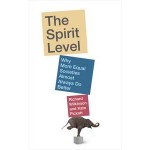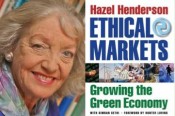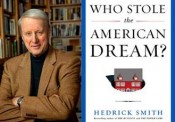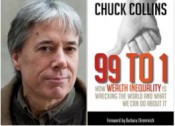Q&A: RICHARD WILKINSON & KATE PICKETT, Authors – The Spirit Level: Why More Equal Societies Almost Always Do Better
Written on March 2nd, 2014 |
Originally Aired: 01/31/10
RICHARD WILKINSON & KATE PICKETT authors of an important new book: The Spirit Level: Why More Equal Societies Almost Always Do Better
In the UK, the Guardian says The Spirit Level “might be the most important book of the year, and The New Statesman named it one of the top ten books of the past decade.
Based on thirty years’ research, The Spirit Level shows that unequal societies are bad for the well-off as well as the poor, when it comes to health and social problems, child well being, life expectancy, infant mortality, obesity, educational scores, drop out rates, illegal drug use, mental illness, homicide, incarceration, CO2 emissions, recycling, social mobility, innovation, and levels of trust.
The good news: If all these ills are related to one measure – income inequality, then, decreasing inequality should be the central goal of our politics because we can be confident that it works.
RICHARD WILKINSON has played a leading role in international research on inequality. He studied economic history at the London School of Economics before training in epidemiology, and is Professor Emeritus at the University of Nottingham Medical School and Honorary Professor at University College London.
KATE PICKETT is a senior lecturer at the University of York and a National Institute for Health Research Career Scientist. She studied physical anthropology at Cambridge, nutritional sciences at Cornell and epidemiology at Berkeley before spending four years as an Assistant Professor at the University of Chicago.
Free Forum Q&A- HAZEL HENDERSON, Ethical Markets Can We Still Solve Big Problems?-Part2
Written on January 29th, 2014 |
Aired: 1/26/14
As we begin a new year, let’s look at where we are in the big picture. What are the most critical issues facing the US and the world? How do you see things moving in those areas? How are things getting worse or better? What should we be keeping our eyes on in the year to come?
My guest this week will be HAZEL HENDERSON, who’s been asking these sorts of questions for at least the last 40 years. We’re going to approach this exploration globally as well as nationally, with a long-term view, and with an eye toward relationships and systems that we often miss in our day-to-day focus on the latest news and events.
If this sounds familiar, it’s because this was my plan a few weeks ago when Hazel was my guest. But we ended up spending so much time on her journey – a remarkable journey it is, a mom in New York who’d never been to college got upset about pollution threatening her young child, became an activist, and developed into a global expert on economics and sustainability.
Free Forum Q&A: SARAH VanGELDER Editor-in-Chief, YES! Magazine 10 Hopeful Things That Happened in 2013
Written on January 7th, 2014 |
Aired 01/05/14
These days the media are full of lists – the best and worst of 2013 – movies, TV, music, books, etc. as well as lists of resolutions and tips for 2014. So when I got an email from SARAH VanGELDER, co-founder and editor-in-chief of YES! Magazine, in which she wrote. “I just posted my end-of-year column on the stories from 2013 that could make 2014 transformative,” , I invited her to join me today. She actually titled her article, “10 Hopeful Things That Happened in 2013 to Get You Inspired for What’s to Come,” and that sounds like a great conversation to start the new year.
We’ll look back and ahead with an eye toward catching the waves or the winds of change, building on the best of last year to make 2014 even better. Let’s commit to taking action to move us all a bit closer to a world that just might work.
Q&A: Hedrick Smith – Who Stole the American Dream
Written on September 18th, 2012 |
Aired 09/16/12
Last week I interviewed longtime reporters Don Barlett and James Steele regarding their new book, THE BETRAYAL OF THE AMERICAN DREAM, looking at the relentless economic, financial, and governmental process over the last 40 years to enrich the largest corporations and richest individuals at the expense of the middle class. This week I’ll talk with another wise and experienced Pulitzer prize winner with a long term perspective, HEDRICK SMITH, about his newest book, WHO STOLE THE AMERICAN DREAM?
I don’t think it’s a coincidence nor do I think it’s redundant to turn so soon to the same questions being pursued by another savvy journalist. HEDRICK SMITH had already won a Pulitzer by 1973, the year that the post-WWII boom for the middle class began to wane. Real wages for all Americans had risen pretty consistently from the war years, and have done so almost not at all ever since. I point this out to highlight the fact that Smith has witnessed first-hand the rise and long fall of the middle class and brings that experience to this book and this conversation.
http://americawhatwentwrong.org/
Q&A: CHUCK COLLINS – Author, “99 to 1”
Written on April 17th, 2012 |
Aired 04/15/12
For over thirty years, you and I have lived through a radical redistribution of wealth — upward, to a tiny fraction of the population — as though we’re part of a bizarre experiment to see how much inequality a democratic society can tolerate. Finally this past year, as a result of the Great Recession that burst the mortgage/refi/credit card bubble that had allowed too many of us to deny reality, people have woken up and “We are the 99%,” the rallying cry of the Occupy movement, has spread far and wide.
CHUCK COLLINS has been on the case since at least 1995, when he co-founded United for a Fair Economy to raise the profile of the inequality issue and support efforts to address it. In fact, when he did so, he was one of my first guests on this show and we talked then about the same issues we will talk about today.
Chuck’s new book, 99 to 1: How Wealth Inequality is Wrecking the World and What We Can Do About It, paints a picture of how disparities in wealth and power play out in America and the world, and identifies the shifts in social values, political power, and economic policy that have led to our current era of extreme inequality. He lays out the destructive cost of inequality on virtually every aspect of society.
But Collins believes there’s hope and offers proposals for closing the gap, and a guide to many of the groups working toward a society that works for everybody.
